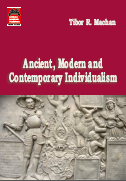Ancient, Modern and Contemporary Individualism
Ancient, Modern and Contemporary Individualism
Author(s): Tibor R. Machan
Subject(s): History, Ethics / Practical Philosophy, Political Theory, Political economy, Social Theory
Published by: Addleton Academic Publishers
Keywords: politics; economy; individuality; history; ethics; political dialogue; individual rights; political economy;
Summary/Abstract: An individualist usually believes that human beings, contrary to what socialists like Karl Marx or Auguste Comte thought, are first and foremost unique, irreplaceable members of the human species, capable of independent thought and action once they reach maturity, and free to choose their conduct based on their conscious thinking. As such, they require the kind of community that makes room for their independence, a community that protects individual rights to life, liberty and the pursuit of one’s chosen goals in life. Although members of the human species and thus possessing a few common attributes, human individuals are a varied lot and flourish best in communities that makes varied pursuits possible, such as the free market political economic order. From time immemorial the individuality of human beings has been evident (mostly so in creative realms such as art, religion and technology) although often suppressed by rulers who wanted a one size fits all type of society to serve their own objectives. So in various historical times it has been a struggle to forge political-legal systems that do full justice to our human individuality.
- Print-ISBN-13: 978-1-935494-62-1
- Page Count: 124
- Publication Year: 2013
- Language: English
- eBook-PDF
- Table of Content
- Sample-PDF

